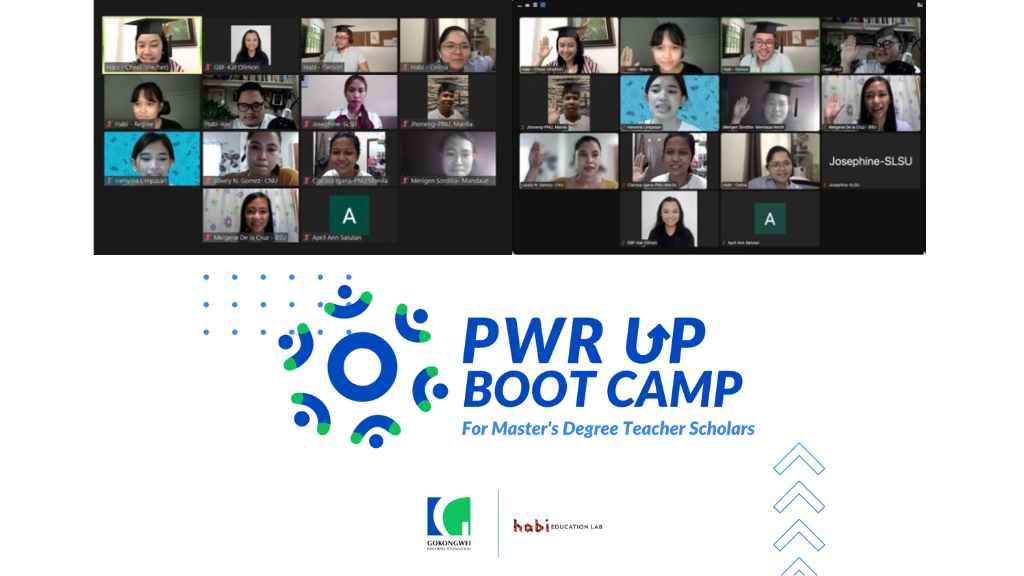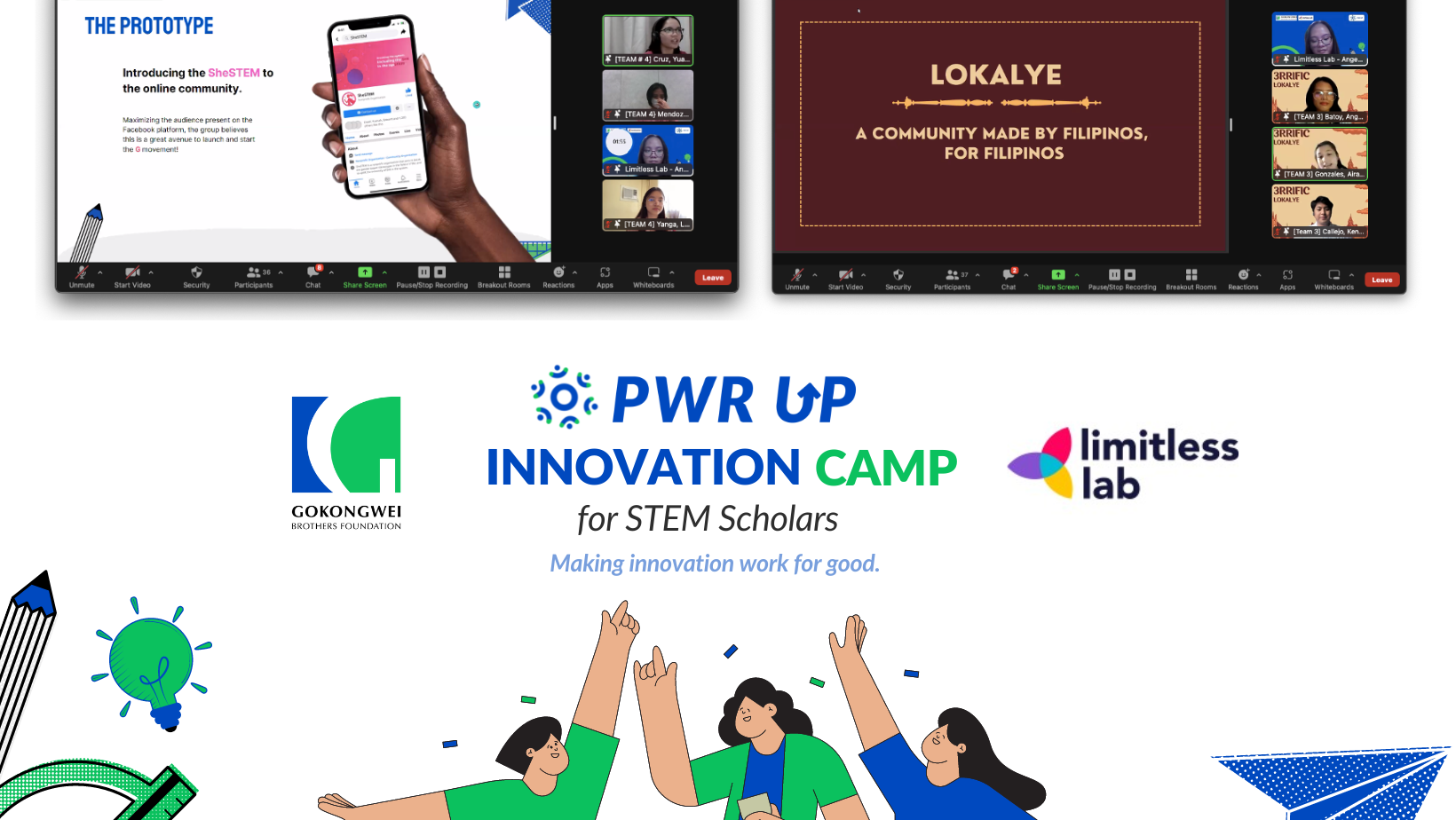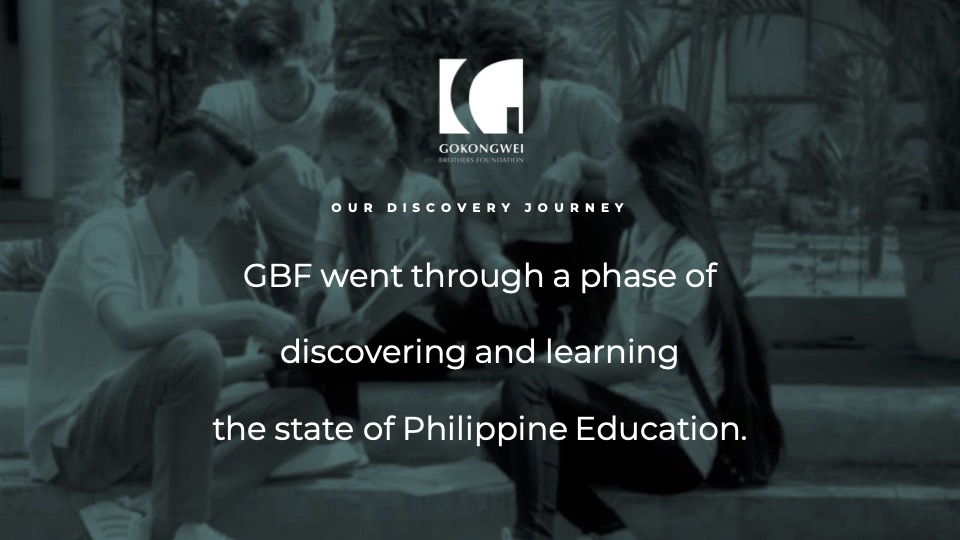With the continuous effort of the Gokongwei Brothers Foundation to equip in-service teachers of the country, a TeachSTEM Scholarship program was granted to excellent teaching individuals to pursue graduate studies for career advancement. Within the framework of this scholarship program, Gokongwei Brothers Foundation, in partnership with Habi Education Lab, put forward a three-week virtual Bootcamp from July 18, 2022, to August 8, 2022, to cultivate and upskill the design thinking of the teacher-scholars.
Thirty-three TeachSTEM master's degree scholars coming from different cities, came together to become problem solvers and help create constructive solutions to each of their school's challenges. This PWR Up Bootcamp aims to provide innovative design-thinking skills among teacher-scholars and help them create prototypes that will answer the needs of their school community. Other than that, it also seeks to nourish each of the teacher-scholars' skills and knowledge.
The workshop was divided into four synchronous virtual sessions and two self-led sessions about sense-making and prototyping ideas that are useful for each of their communities. Teacher-scholars who were unable to attend the synchronous virtual session are encouraged to participate asynchronously and record their feedback using the "Manghahabi Kit" provided to them at the beginning of the Bootcamp.
Gearing towards an amazing adventure
As the first workshop session started, design thinking was introduced to the teacher-scholars by simply creating a shoe for each of their assigned partners. This is where they start grasping how design-thinking works. "A structured, but a messy approach to finding and solving problems." The CEO of Habi Education Lab, Mr. Gerson Abesamis connotes how design thinking gathers information from customers to build a final product that suits their preferences. He also stated that design thinking takes a more intelligent, structured, and human-centered approach to addressing a certain problem based on observations.
To fully understand the process of design thinking, each of the teacher-scholars was asked to identify an explicit problem in their respective school communities under each of the following categories: diversity of learners, teaching and learning resources, assessment, research, reproductive health, and mental health. Within those categories, the teacher-scholars discussed these problems together with the Habi learning coaches and were directed to answer their worksheets at the Manghahabi Kits.
A human-centered solution is what design thinking is all about. And to achieve such work, the teacher-scholars were asked to create a persona of someone who is directly affected by each of the problems they identified. One of the teacher-scholar participants, Ms. Sheila Caballero, identified a challenge that focuses on students with low academic achievement and interest in Science. According to Ms. Caballero, despite the efforts of the Science Teachers to provide innovative teaching strategies by means of implementing a research symposium, students still have a low interest in learning.
Teacher-scholars and their prototypes
With each of the teacher-scholars identified design problems and persona, the participants were grouped by their problem category. Through this, they were able to brainstorm and decide the most feasible solution they can provide to their given primary problem.
During their first self-led session, they were tasked to try out the sensemaking method individually or with their theme group. But due to the teacher-scholars' different and busy schedules, most of them opt to do the task individually.
Moving forward to their second self-led session, the teacher-scholars are provided with different tools that they can use to plot their prototype for each of their problems. This was then recorded again to their Manghahabi Kit to document their experience.
Once each theme group formulated a prototype for their chosen problem, the teacher-scholars were asked to gather feedback on their prototypes to improve the idea. With Darleen Joy Dimaano's prototype which is based on her primary design challenge of helping teachers lessen their paperwork, feedback on creating a single assessment output was given by Nino Estrada, her partner during the activity.
Through this feedback, an idea to collaborate with other subject teachers to create a single project was developed to address the problem. Ms. Dimaano plotted as well how she will run through her prototype within her school community. One of the next steps she included was to set a date for the LAC session suitable for everyone's schedule which was set to be accomplished last August 22 to 26, 2022.
After the feedback session, the participants were divided into smaller groups to present and listen to each of their project summaries and work. A set of tips for applying design thinking in school was also shared right after the presentation of each group.
The significance of PWR Up Bootcamp
The whole three-week boot camp was an eye-opener for most of the participants. They have become more resilient in understanding the design thinking process and were able to appreciate its importance. One of the teacher-scholar stressed, "Sharing experiences enlightened me that we have so many teachers who experience the same situations, and these sharing opportunities helped me grow to view other perspectives." Through the help of the coaches, the teacher-scholars were able to maximize their potential and moreover improve their skills in resolving challenges.
"Sharing experiences enlightened me that we have so many teachers who experience the same situations, and these sharing opportunities helped me grow to view other perspectives."
A short graduation ceremony was held on the last day of the boot camp and a Design Thinker's Pledge was recited by the participants to conclude the event. After some group photos, the cohort of scholars was reminded to finalize their Manghahabi Kits output.
Wrapping up!
After six months GBF will be conducting a focus group discussion among the PWR Up Bootcamp participants to check in with the prototypes they had presented. This will then be a supplementary support to further develop their prototypes implemented within their communities. With the promising result of this three-week boot camp, GBF has high hopes for the scholars to provide a constructive solution to each of their school communities' challenges and be a provider of quality design thinking projects.





